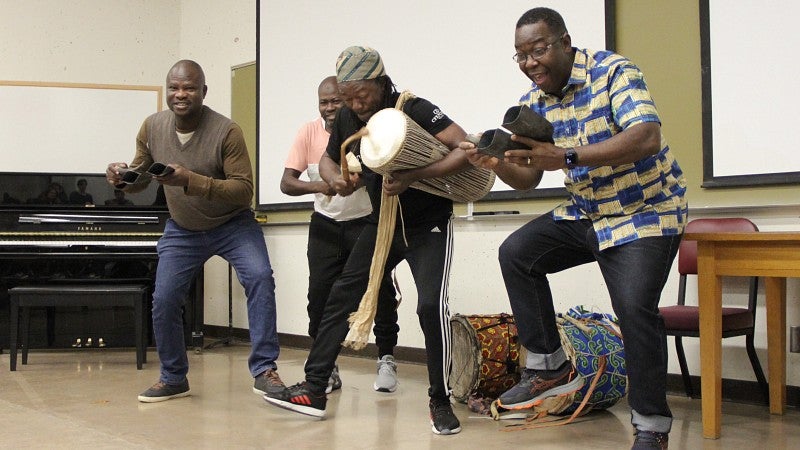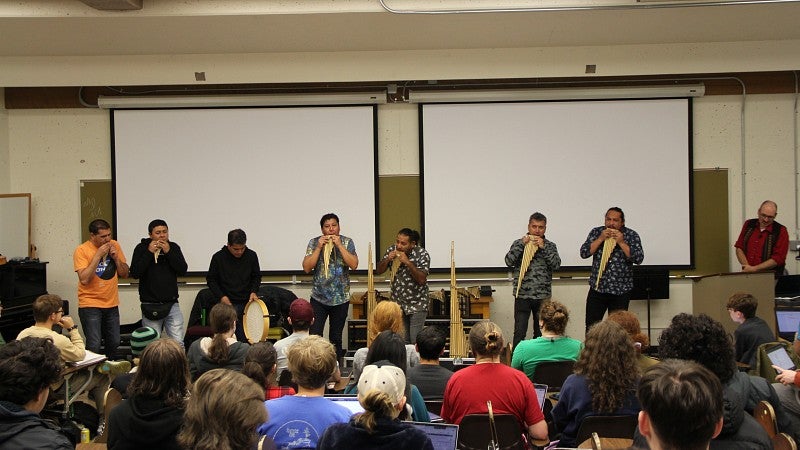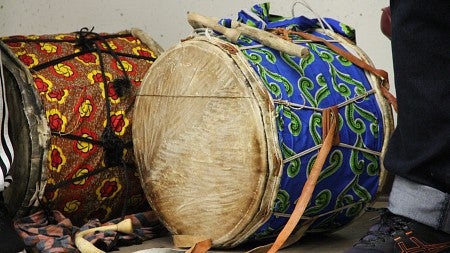
Ethnomusicology (noun): the study of music in and as culture
All graduate students across the University of Oregon campus now can enrich their degree with a specialization in ethnomusicology. “By introducing this specialization, we are offering students a set of methods that can be used to study diverse musics, from classical and jazz to African and Latin American popular musics,” Ed Wolf, Associate Professor of Ethnomusicology, said.
Wolf envisions students from a plethora of educational backgrounds enrolling in the program. For example, anthropology students may enjoy thinking about the cultures they are studying through the lens of music. “Most of the students that engage with these classes come away with a different understanding of music that they haven't had before and that, hopefully, changes the way they engage with music in their daily lives – for the better,” Wolf said.
A total of 18 credit hours, the specialization breaks down as follows:
Core Courses
- Introduction to Ethnomusicology, 4 credits
- Folklore Fieldwork, 4 credits
- Seminar in Ethnomusicology, 4 credits
Ensemble Courses (choose one)
- World Music Ensemble, 2 credits
- Dema African Performance Ensemble, 2 credits
Additional Class (choose one of several options including)
- Musical Instruments of the World, 4 credits
- Popular Music in the African Diaspora, 4 credits
- Seminar in Ethnomusicology (must be different from core course topic), 4 credits
During the ensemble courses, students will put theories learned in the academic courses into practice. “We learn, theoretically, how music helps build community,” Wolf said. “Then in these ensembles, we're often building community ourselves.” All students, regardless of musical background are invited to participate, and Wolf says students who are not in the School of Music and Dance (SOMD) should not feel intimidated. “You don’t have to be a musician already because in many cultures around the world, they want everybody engaged and they keep performances easy to enter into,” he explained.
He expects musicians, too, to have a new experience due to the different dynamic of the groups with which they will play. “Many of our SOMD students have been studying music through reading and formal study,” he said. “Then, when they engage with music on new instruments without having it necessarily written on the page, they experience an interaction with other musicians face-to-face in a way that sometimes we overlook in other practices.”
The genres of music that students can explore in the World Music Ensemble class range from Puerto Rican and Andean music to American Roots music. American Roots, offered in Winter 2024, will mark the first UO ensemble dedicated to the performance of pre-war American folk and rural styles, including old-time, bluegrass, acoustic blues, gospel, and early country. Students will get their hands on guitars, banjos, mandolins, fiddles, and other string band instruments. Music of the Andes, offered in Spring 2024, will involve learning about and playing instruments like panpipes, duct flutes, mandolins, accordions and charangos.

Led by Associate Professor of Ethnomusicology and Dance, Habib Iddrisu, Dema African Performance Ensemble will combine the study and performance of traditional arts, including drumming, dance, singing, and storytelling from a variety of African cultures. “My goal with Dema is to advance cross-cultural understanding by providing an opening for UO students to move outside their comfort zones,” Iddrisu said. “Students will expand their world views through performances, student interactions, and interactions with performers and teachers from African nations.”

For students interested in declaring the ethnomusicology specialization, now is a wonderful time to do so! Intro to Ethnomusicology is offered every other year, and will be offered in Winter 2024, so it will not be offered again until 2026. Ideally, students are encouraged to take the Intro class first, but they can also take the other courses first. Students with questions can contact Ed Wolf at ewolf2@uoregon.edu. To declare the specialization, students can contact Kathie Hsieh at khsieh@uoregon.edu.
